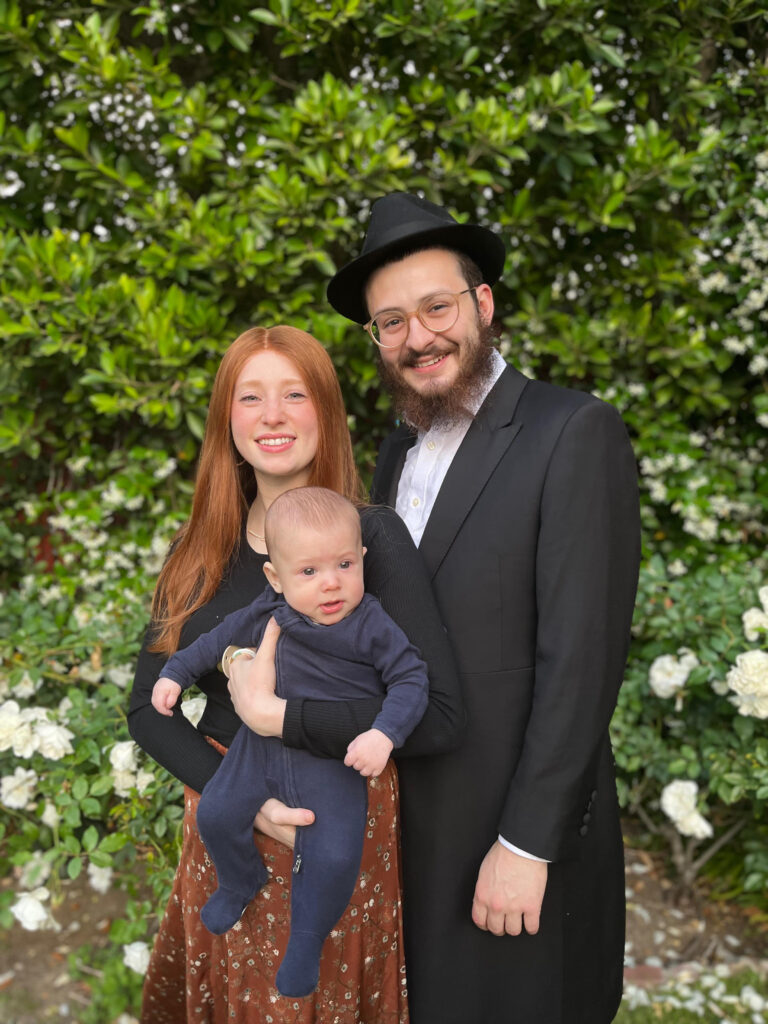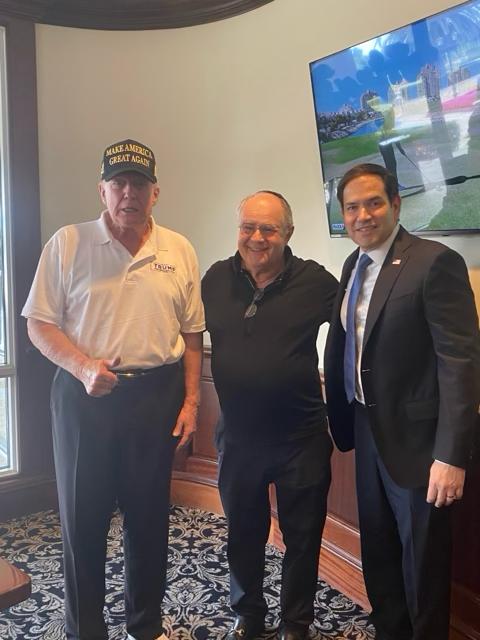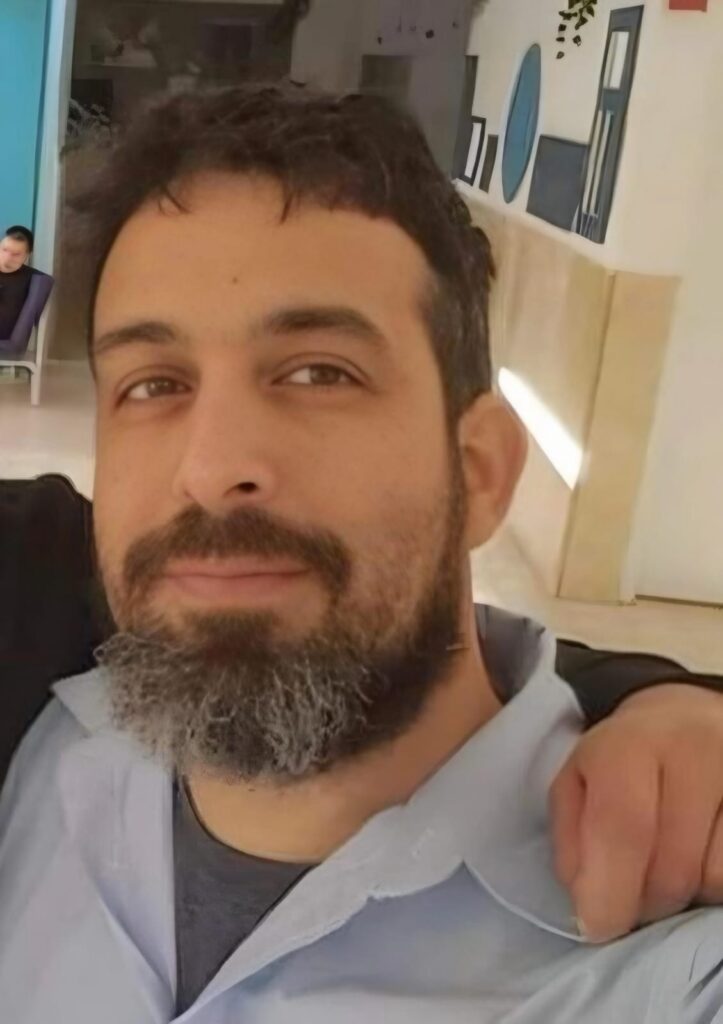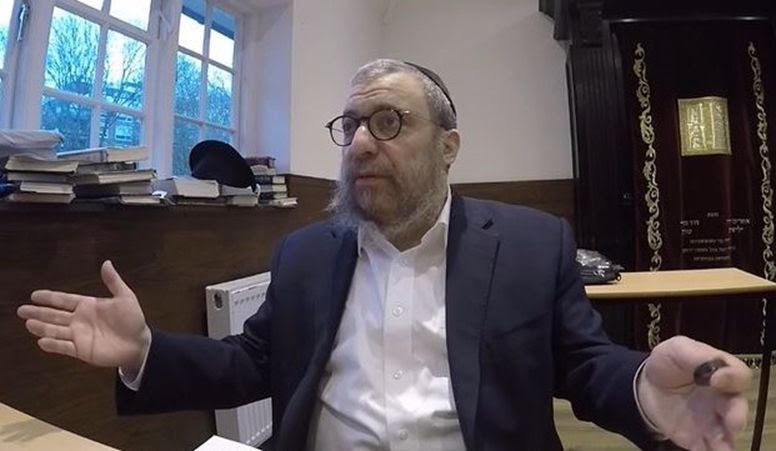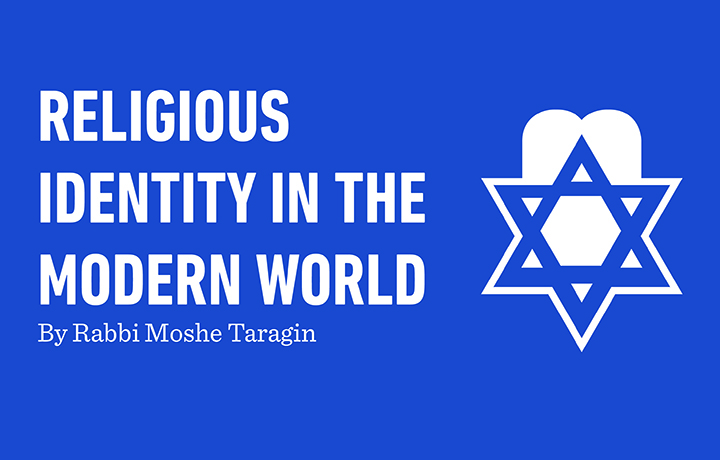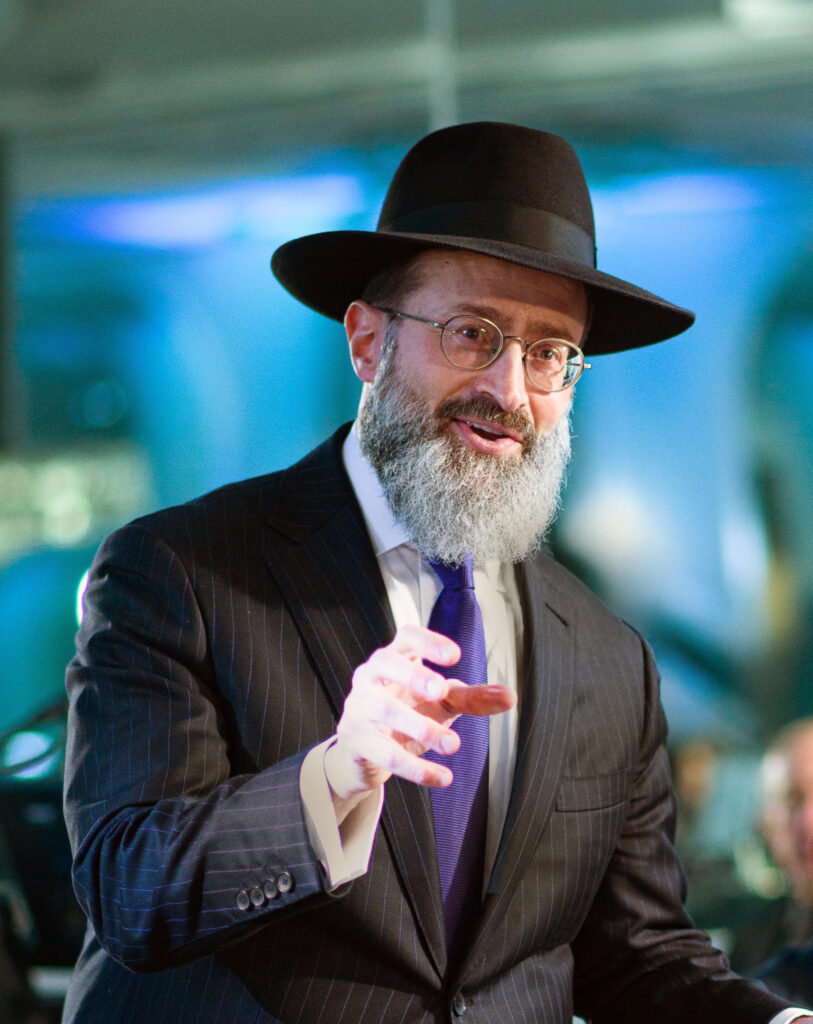Musings Of A Shliach From Montana
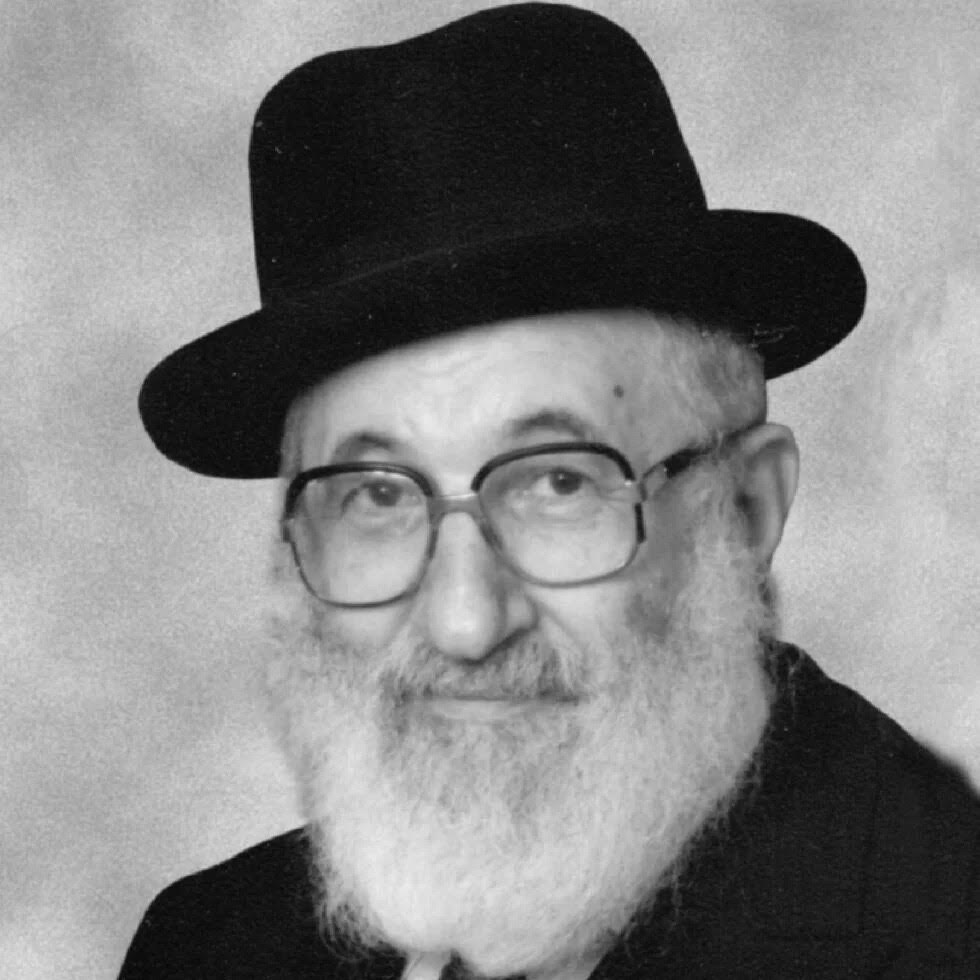
Rabbi Berel (Bernard) Levy of OK Kosher
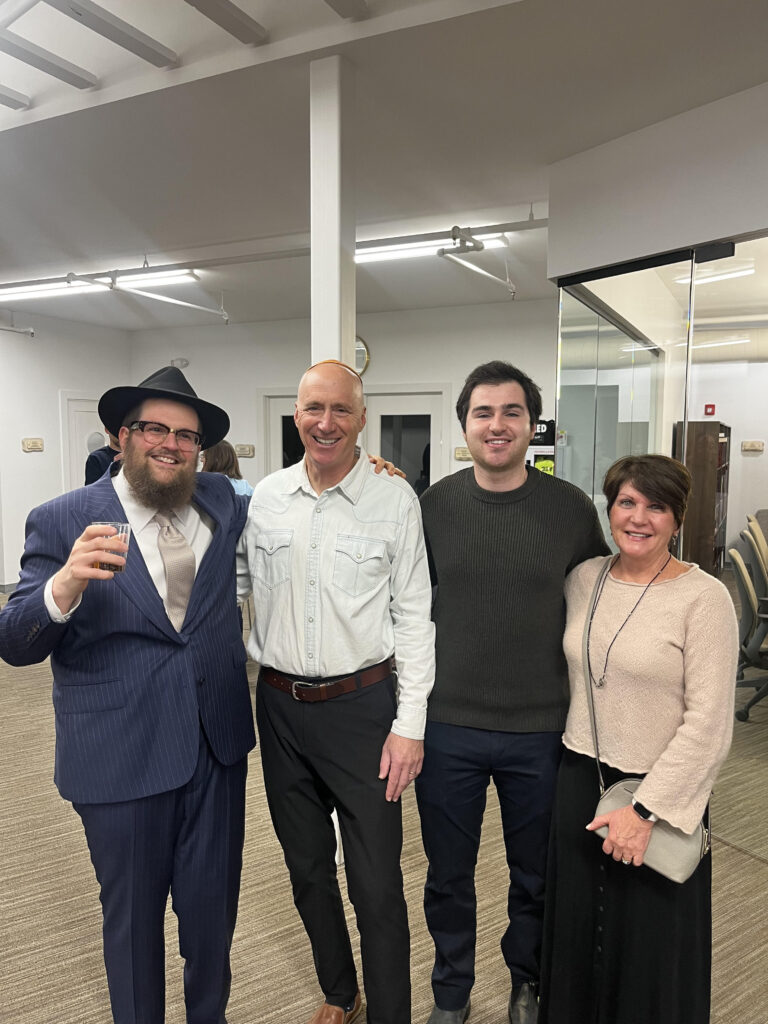
Rabbi Chaim Bruk with Howie and his family
“Sushi, Cheesecake, and the Ten Commandments,” that’s how we advertised our Shavuos celebration in Bozeman this year. And Baruch Hashem, close to seventy Yidden came together to hear the Aseres Hadibros and celebrate one of the shalosh regalim, one of the three major Jewish festivals. Many Jews in the diaspora do not celebrate the holiday of Shavuot, and in Israel, some view it as nothing more than a day when we eat chalavi. For some reason, Jews who attend a Pesach Seder, light a Chanukah menorah, or go to shul on Yom Kippur have not heard of Shavuos.
Back in 2007, just three months after arriving in Bozeman, we hosted our first minyan for kriyas haTorahon Shavuos and while today we have, Baruch Hashem, so many Jews coming together for this important yom tov, the holiday of Matan Torah is still something that needs to be publicized and sold to our Jewish brothers and sisters and that’s where the sushi and cheesecake come in.
I have learned that just because many Jews have not heard of it, that doesn’t mean they’re not open to celebrating it. While the sushi and cheesecake on the first day was fabulous, there was something very special about the second day when Jews came to say Yizkor, to memorialize those they loved who have passed away. I make sure that those who need to say it do so with a minyan. As the delicacies of day one were super enticing, I knew that day two would be harder, especially on a weekday. So, on erev yom tov I reached out to a bunch of Yidden who don’t regularly come to shul and boy did they show up to make it happen.
As I observed my congregants, my heart was warmed. There was Richard, who I’ve known for almost two decades and is a board member of the Reform Temple in town. He’s a sweet neshamah and it turns out he had yahrzeit for his dad on the 7th of Sivan, so it was an honor to call Zalman ben Tzvi Hirsh to the Torah. We also called Shlomo ben Dov (Eric), who is an attorney in town and has never been to one of our minyans, as well as Shneur Zalman ben Chaim (Jeff), who is a warm Jew who moved here from Chicago. And then there was Andrew, a physician who moved from Wyoming, and Barrett Ben Ralph, who comes whenever we need a backup man for the minyan, a sincere Yid who has been practicing the berachos for the Torah to perfect them. These fine Yidden in addition to our Kohen, Reuven ben David (Randy), and our Levi, Meir Amshel ben Leib Leizer (Marc), along with Seth, Mick, Mitchell, and Jake comprised our yom tov minyan.
It’s an art to pull Jews together and make a community thrive without becoming a nudge who harasses people all the time. It’s a balance that takes thoughtfulness and creativity. Thank G-d we have a solid built-in crowd for Shabbos and yom tov, but on a gorgeous June day, in the middle of a work week, on a holiday that isn’t very popular or well known, it’s harder, yet this chevra not only came together, they loved it.
Andrew texted me: “I always enjoy hearing you speak. It is meaningful and pertinent to our crazy society…My experience with minyans makes me always feel I should go. I was a medical student in Austria; there was rarely a Jewish person found in the city. I lived in Graz. As students, we were frequently called upon by the old surviving Jewish community to be part of a minyan…” Another member, Barrett, wrote: “That was a great Tuesday turnout. Glad to be part of it. While the Psalms bore me to tears, the stories and your sermon always make it well worthwhile.” And then Eric wrote: “Happy to help…I really liked your sermon.”
I came out of yom tov feeling elated, as our people are truly amazing. While we certainly have challenges, Mi K’Amcha Yisrael, we are an incredible nation, representing the infinite in a world that is far too often finite and limited in capacity. We must never give up on Klal Yisrael; we must never buy into the doomsday discussions about the future of Jewry since each Yid is connected to the core of Hashem, and anyone who interacts with our fellow Jews sees it clearly. Just last week, Chavie’s youngest sister, Brocha, along with her husband Rabbi Mendel Backman and their baby Yitzchak moved to Bozeman for a one-year placement, to support and grow our work in the Jewish community. They’re joining us because Chavie and I can hardly keep up with the growth of the community, and having another couple on board, even if it’s just for a year, can do wonders for these amazing neshamos.
We can’t take our eyes off the ball.
In this week’s parashah, Behaalosecha, we read about Aaron HaKohen lighting the Menorah in the Mishkan. The verse says, “Aaron did exactly so; he lit the lamps…Just as The Eternal had commanded Moshe.” Rashi says, “This is written to tell us Aharon’s praise, that he did not change anything,” The commentaries have various explanations as to why it’s considered novel that Aaron follows the instructions he was given, but I came across a teaching from the Bnei Yissachar that is fantastic, and I want to share it with you:
He begins by quoting the Sefer Chassidim that shares a tale about a holy man whose piety was unknown and was thus hired as a shamash in the local shul. One of his jobs was to fill the oil in the shul lamps. As his mind was always in a state of spiritual ecstasy, he often spilled the oil and made a mess. Many congregants thought that he was a schlimazel. Eventually the sage of the city realized how great this man was and swapped him out: the sage becoming the shamash and the shamash becoming the city sage.
Says the Bnei Yissachar that Aharon HaKohen was a super holy man and no doubt that his service of lighting the Menorah entailed super concentration, incredible kavanah, so he could have easily lost his focus and spilled the oil or overfilled the lamps, and this is what Rashi is emphasizing, that Aaron didn’t lose focus of the practical goal and didn’t forget what it’s all about, even when in a state of supreme spirituality.
Losing the plot is never a good idea.
This idea has similarities to something I once read from the Rebbe, zt’l: Since the lighting of the Menorahentailed a heavy dose of miracles, Aaron could have thought that the details of how he did his job were irrelevant, because the miracles would ensure that everything was done properly. Yet he didn’t do that. He followed the mitzvos (his commandments) perfectly, even though his actions were accompanied by the intervention of Hashem’s hand.
All of this really brings home to me the importance of not taking our eyes off the ball. We aren’t here to judge and pontificate about Jewry, but rather to show up for our brothers and sisters and recognize that with a little push, a little kick in the pants, we can awaken super soulfulness in them and subsequently in ourselves. We don’t throw our people under the bus; we don’t take the easy way out. We find souls who are lost, we find brothers and sisters who were not lucky enough to have our upbringing, and we bring them on board or we make sure they know they are welcome to board anytime.
Over Shavuos, I was reading an awesome book: “Kosher Investigator: How Rabbi Berel Levy Built the OK and Transformed the World of Kosher Supervision” by Dovid Zaklikowski. It details how Rabbi Berel Levy built the OK Laboratories and transformed the world of kosher supervision. In addition to his fascinating work at Torah Umesorah and his journey of becoming a Lubavitcher, he truly changed the world of kosher supervision, insisting that agencies inspect the source plants and not rely on paperwork alone for kashrus oversight. Yet, in 1986, the OK supervised a company that was A-okay and was later discovered to have changed one ingredient coming out of France that was problematic and potentially a major Pesach kosher challenge. Instead of everyone realizing that it was a genuine mistake, the other prominent agencies cashed in on the mistake and did everything in their power to destroy the OK with public defamation. While the attacks didn’t destroy the OK, since they still occupy the help of the highest standards of kashrus, their lack of basic decency when they threw Rabbi Levy under the bus took a toll on his health and led to his death via a heart attack just a bit over a year later.
I was reading this chapter in the book and sat in my kitchen, dumbfounded. How could people who are Ehrliche Yidden do something like this? How could they not give Rabbi Levy the benefit of the doubt? A man who had supreme mesiras nefesh for the Jews of the USSR, for education in America, and for the highest standards of kashrus should be railroaded so viciously? A man who was supported by Reb Moshe Kotlarsky, zt’l, and Reb Shmuel Kamenetsky, shlita, should be driven to a heart attack?
Don’t get carried away and spill the oil.
It’s just another example of how important it is to remain focused on the essence of what it means to be a Yid and to never get caught up in personal agendas that are either too holy or too egocentric along the way. As I think about Howie, our first day Levi, washing the hands of Randy, our Kohen, for Birkas Kohanim, I was enthused that our people are alive, our people are going strong, and our people must never be ignored or thrown under the bus.
Mi K’Amcha Yisrael. n
Rabbi Chaim Bruk is co-CEO of Chabad Lubavitch of Montana and spiritual leader of The Shul of Bozeman. For comments or to partner in our holy work, e-mail [email protected] or visit JewishMontana.com/Donate.





